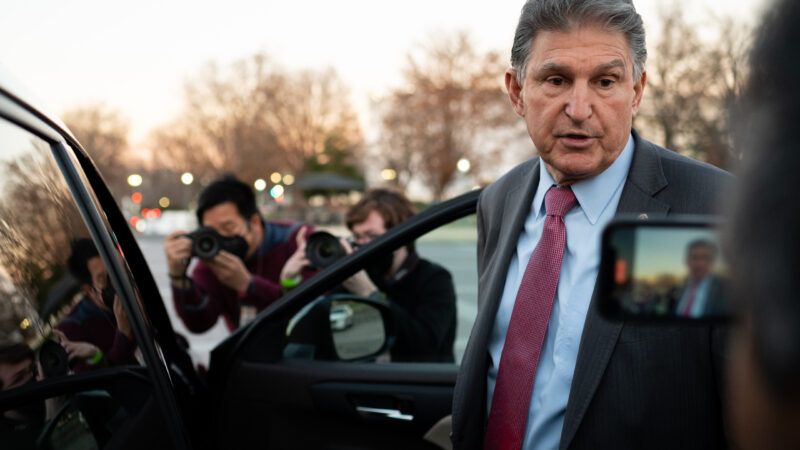Joe Manchin Is Once Again Telling Republicans and Democrats What They Don't Want To Hear
But it's exactly what they need to start talking about.

During the first two years of the Biden administration, Sen. Joe Manchin (D–W.Va.) often ended up having to be the responsible adult in the room.
Democrats had full control of Congress for the first time in over a decade, and many of them intended to behave like children left alone in a candy store—each pile of sugary goodness providing the energy to eat another, and another, consequences be damned. Manchin was the parental buzzkill, popping up every few months to remind his fellow Democrats that more federal spending won't fix runaway inflation, that budget deficits still matter, and that you can't tax money that doesn't exist.
Now, control of Congress is divided between the two major parties—but Manchin seems determined to keep delivering reminders to eat some vegetables.
In an interview with Fox Business host Neil Cavuto on Thursday, Manchin stressed the need to put Social Security and other federal entitlement programs on a more stable footing—in light of the fact that Social Security benefits will be automatically cut when the program's trust fund hits insolvency in or around 2034.
"If we do nothing and just sit back with our hands in our pockets and say, 'Oh, we can't get involved,' they're going to have automatic cuts. We can't let that happen," Manchin said.
That's a reality that many top Democrats and Republicans refuse to acknowledge—both Biden and former President Donald Trump have pledged not to touch Social Security. But Manchin is absolutely right: Anyone who argues for leaving the entitlement programs untouched today is actually advocating for automatic, unavoidable benefit cuts in a decade.
That's a situation that should be spurring a conversation in Washington about what the future of Social Security should look like, but Manchin is one of the few lawmakers willing to even raise the question. And the unwillingness to talk about the problem is a major impediment to finding solutions, he said Thursday.
"Is there a better program, is there a better way younger people can invest and have something for retirement? I don't know, but if you can't even sit down and talk with experts and talk with people…to say you're not even going to discuss anything?" Manchin said, adding that the only thing he'd take off the table is benefit cuts for people who are currently receiving them.
In fact, yes, there are better options for young people. Abolishing Social Security would mean younger workers wouldn't have their paychecks taxed to pay for benefits that flow to older and generally wealthier Americans.
With that extra money, young workers would have more flexibility to invest as they see fit—and most private retirement accounts are more lucrative (and, importantly, more sustainable) than Social Security. According to a 2016 Tax Foundation study, a worker retiring after making average wages could expect an annual payout of about $20,000 from Social Security. If that same worker had invested just 10 percent of their annual earnings into a typical retirement account, they'd enjoy an annual retirement income almost three times greater.
Any major change in entitlement policy is going to have tradeoffs, and there will, of course, have to be a period of time for winding down Social Security to ensure that older workers don't have their retirement plans suddenly blown up and that truly needy retirees are protected. But that process should start now—indeed, it should have started years ago.
Manchin also took to the Senate floor on Thursday to excoriate both parties for diving up the national debt to unsustainable levels—a separate but related problem since the growing costs of entitlements are one of the primary drivers of the $31 trillion national debt.
"We've been spending more than we bring in every year for the past 21 years, and the debt that has resulted from that is absolutely crippling," he said, pointing out that presidents and congressional leaders from both parties are responsible for that long track record of busted budgets. "My Democratic friends don't want to say a word about our out-of-control spending and are outright refusing to even talk to Republicans about reasonable and responsible reforms."
"Our problem really isn't a Republican problem or a Democratic problem, it's an American problem," he added. "We have a problem, and only if we start putting our country first and acting as Americans can we fix it."
Again, he's absolutely right. When Social Security goes insolvent, the benefit cuts won't fall only on Republican voters or Democratic ones. The diminished standard of living that comes as a natural consequence of having too much debt will affect all Americans—and is particularly painful for those already living with less, regardless of whether they are living in a poor urban area or in eastern Kentucky. There's no way to solve the debt and entitlement crises with zero-sum politics that filter everything through a stupid binary of Red vs. Blue, so most politicians simply choose to avoid the topic altogether.
And when you were hoping for another all-night buffet at the candy store, no child or politician wants to be told that the real choice is between boiled broccoli and steamed spinach. But there are tough questions that Congress needs to start asking, both internally and in conversation with Americans. What's the purpose of Social Security? Do wealthy retirees really need federal handouts? If taxes must be raised to keep entitlements running, what will the economic consequences be? And, as Manchin said Thursday, are the better alternatives out there?
Don't trust Manchin to get all the answers right. After all, he did support the Inflation Reduction Act, which claimed to reduce future budget deficits but ultimately only offset a small amount of the new spending approved since Biden took office.
Still, it's good that at least someone is asking these questions. Manchin should keep it up.
